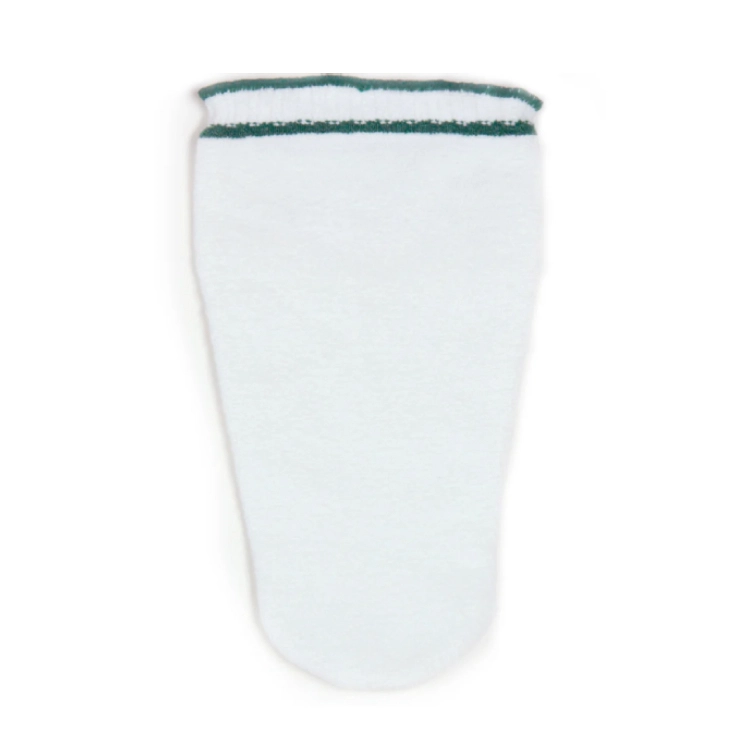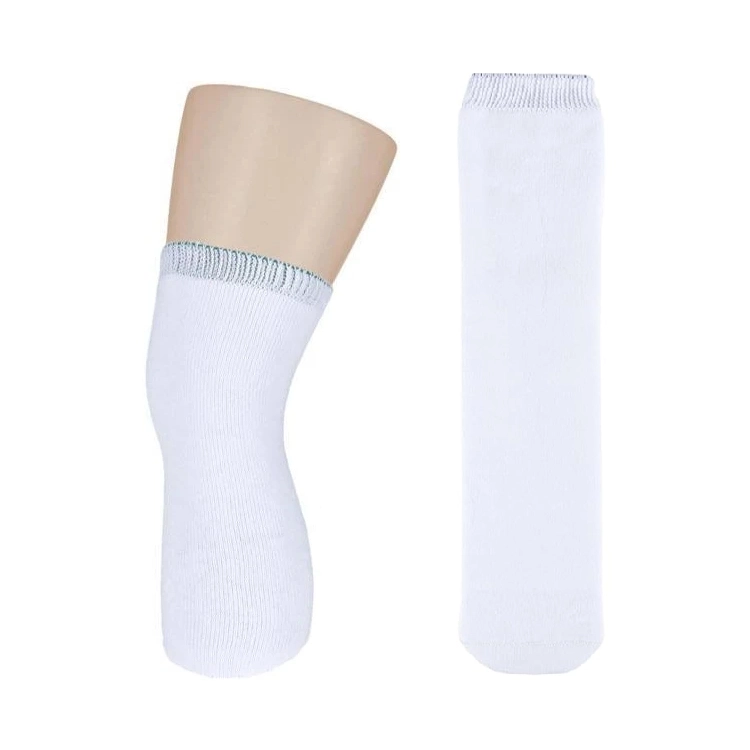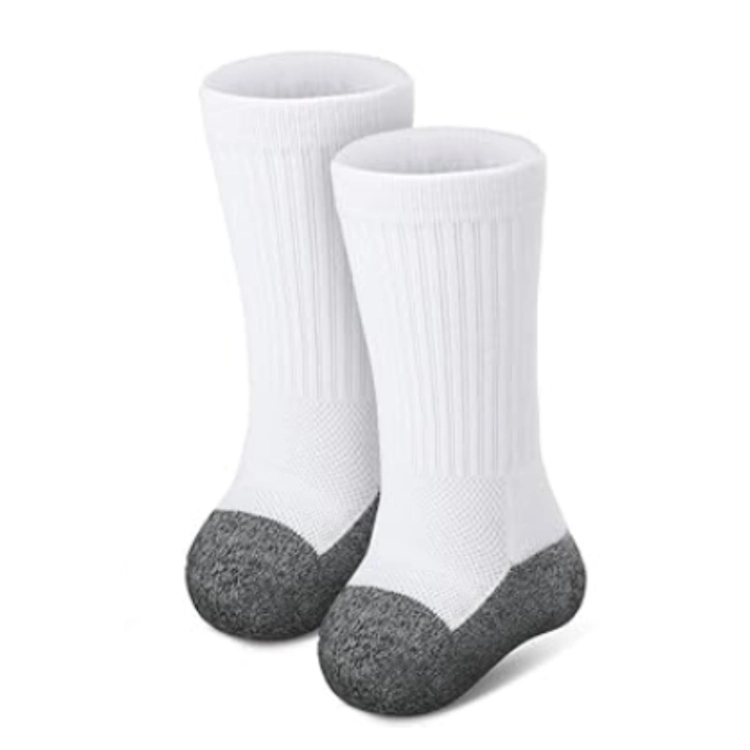Custom Prosthetic Socks & Stump Socks Manufacturer
MOQ Pairs
Monthly Capacity
Product Warranty
Explore Our Amputee Stump Sock Styles

Cotton Stump Socks

Stump Socks Below Knee
Silicone Stump Socks

Silver-Infused Prosthetic Sock
Comprehensive Prosthetic Sock Customization Solutions
We offer a complete range of customization options to create the perfect prosthetic sock for any clinical scenario.
By Ply (Precision Thickness)
1 & 2-Ply (Liner/Sheath): For fine-tuning fit or as a moisture-wicking base layer.
3 & 4-Ply (Standard): The most common choice for managing daily volume fluctuations.
5 & 6-Ply (Cushioning): For significant volume changes or added cushioning.
Key Point: We guarantee ply consistency (±5%) across all production runs.
By Functional Material
Wool: Superior thermoregulation and natural cushioning.
Combed Cotton: Soft, breathable, and hypoallergenic.
Performance Synthetics: Unmatched moisture management.
Lycra®/Spandex Blends: Excellent stretch and recovery.
Silver-Infused/Antimicrobial: Inhibit odor and bacterial growth.
By Craftsmanship & Design
Seamless Construction: Eliminates friction and pressure points.
Reinforced Distal End: Adds durability and cushioning.
Non-Ravel Welt Top: Allows for trimming to length without unraveling.
Hole-in-Toe Access: For locking pin suspension systems.
Gel-Lined Options: For targeted shock absorption and skin protection.
By Length & Limb Level
Below-Knee: Standard 10–20" lengths (Short/Medium).
Above-Knee: Extended 22–28" “Long” options to cover the thigh.
Partial Foot / Foot Shell: Shorty or heel‑less designs for transmetatarsal or foot-level use.
Leg-Length Variants (X‑Short to Long): 8–12", 10–14", 16–20", 22–28".
More Than a Manufacturer. Your Partner in Patient Care & Brand Growth.
Medical-Grade Quality Assurance
Our ISO 13485 certification is your guarantee. Deliver products that meet stringent medical standards, securing the trust of patients and practitioners alike.
100% Brand Customization
From a Pantone-matched logo woven into the sock to fully branded packaging, we help you create a unique product line that stands out and builds recognition.
Expert R&D & Design Support
Leverage our expertise. Receive a free product mockup within 24 hours and expert guidance on material and design choices to accelerate your product launch.
Reliable Global Logistics
Focus on your core business while we handle the complexities. We offer on-time delivery and simplified international shipping solutions, including DDP terms.
Custom Stump Socks—Engineered Around Your Residual Limb, Not Generic Sizes
We solve the daily fit hassles—volume changes, rolling tops, itchy seams—by letting you dial in every variable: thickness, limb level, material, and finish.
Inquiry & Consultation
Share your project details, and our experts will reply within 24 hours with price and solutions.
Sample Development
We craft samples to your specs and send approval photos within 3-7 days.
Sample & Order Confirmation
Confirmation Review your samples and request any refinements. Upon approval, we finalize your order details with a deposit to begin production.
Bulk Production
Production time varies by quantity; regular production time is 3-4 weeks.
Quality Inspection & Shipping
We will ship the bulk order after QC inspection. Choose between express air shipping (5-7 days) or sea freight (3-5 weeks) for most areas.
🔒Your information is secure. We’ll respond within 24 hours with a customized proposal.
Frequently Asked Questions
Get answers to common questions about our custom diabetic sock manufacturing services.
How do you define and verify “ply” in specs?
“Ply” is a thickness rating of a single sock. Literature reports donned thickness around 0.8 mm (1‑ply), 1.2 mm (3‑ply), 1.5 mm (5‑ply). Layering thin socks is a fit-adjustment tactic but isn’t thickness‑equivalent (3×1‑ply ≠ 1×3‑ply). Specify both ply and mm range/tolerance (e.g., ±5%) in POs and QC sheets.
What’s the difference between a stump shrinker and a prosthetic sock?
Shrinkers are elastic garments used post‑op or overnight to control swelling and shape the limb; prosthetic socks are worn inside the socket (with or without a liner) to fine‑tune fit and comfort once you’re using a prosthesis.
Which quality and safety certifications do you provide?
We operate under an ISO 13485 medical‑device QMS and source yarns/fabrics certified to OEKO‑TEX® Standard 100 to ensure low‑toxicity textiles from yarn to finished sock. Copies of current certificates ship with each order.
What inspection level do we reference in the contract?
We use an AQL sampling plan (e.g., AQL 2.5 for major defects, 0 for critical). Define defect classes, sampling size code, and re‑inspection rules to avoid ambiguity at shipment.
How do you keep color and shade consistent across reorders?
We approve Pantone lab dips, then monitor production with spectrophotometer readings and Delta‑E targets. Each batch retains swatches and digital data so reorders match the original shade.
How do you control “ply drift” (thickness change with wear/wash) and volume‑management needs?
We test thickness after defined wear/wash cycles and specify replacement intervals. To help clinicians manage limb‑volume changes, we supply graded ply kits (1, 3, 5, etc.) and document actual mm values so adjustments are predictable.
Expert Knowledge for Better Sourcing Decisions
These articles dive into what buyers really ask: how to audit with AQL, choose antimicrobial yarns/finishes, and plan China factory visits—everything you need to source prosthetic & stump socks with confidence.
Exploring Chinas socks exhibitions and navigation tips
Get practical tips on visiting China’s major sock trade fairs, including preparation, communication, and travel advice.
How AQL standard work for socks inspection
Understand how AQL (Acceptable Quality Level) standards are applied in quality inspections during sock manufacturing.
How to achieve antimicrobial features for socks
Learn how socks can be made antimicrobial with different yarns, finishes, and technologies to enhance hygiene and odor control.
